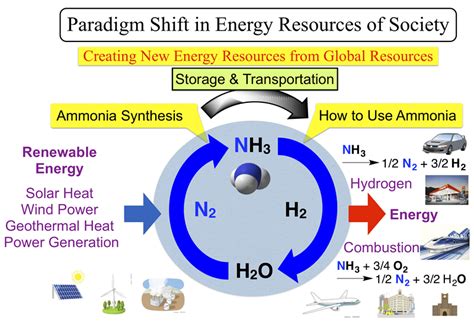The world is shifting towards a more sustainable and environmentally friendly approach to various industries, and one of the key players in this movement is ammonia technology. Ammonia, a compound made up of nitrogen and hydrogen, has been used for decades in various applications, from agriculture to refrigeration. However, recent innovations have opened up new and exciting possibilities for ammonia tech. In this article, we'll explore five innovative applications of ammonia technology that are set to revolutionize the way we live and work.
The Power of Ammonia: A Sustainable Energy Source

Ammonia has long been recognized as a potential energy source, and recent advancements have made it a viable alternative to fossil fuels. One of the most exciting applications of ammonia tech is in the production of hydrogen fuel cells. Ammonia can be used to store and transport hydrogen, which can then be used to power fuel cells. This technology has the potential to revolutionize the energy industry, providing a clean and sustainable source of power for everything from cars to power plants.
How Ammonia Fuel Cells Work
Ammonia fuel cells work by using ammonia as a source of hydrogen. The ammonia is cracked, releasing hydrogen, which is then used to power the fuel cell. This process produces only water and nitrogen as byproducts, making it a clean and environmentally friendly source of energy.
Ammonia Tech in Agriculture: A New Era for Crop Production

Ammonia has been used in agriculture for decades as a fertilizer. However, recent innovations have opened up new possibilities for ammonia tech in crop production. One of the most exciting applications is in the use of ammonia as a nitrogen source for precision agriculture. By using ammonia as a nitrogen source, farmers can reduce their environmental impact while increasing crop yields.
The Benefits of Ammonia in Agriculture
The use of ammonia in agriculture has several benefits, including:
- Increased crop yields: Ammonia provides a readily available source of nitrogen, which is essential for plant growth.
- Reduced environmental impact: Ammonia can be used to reduce the amount of nitrogen-based fertilizers used in agriculture, which can pollute waterways and contribute to climate change.
- Improved soil health: Ammonia can help to improve soil health by providing a natural source of nitrogen.
Ammonia Tech in Refrigeration: A Sustainable Solution

Ammonia has been used in refrigeration for decades, but recent innovations have made it a more sustainable and efficient solution. One of the most exciting applications of ammonia tech in refrigeration is in the use of ammonia absorption chillers. These chillers use ammonia as a refrigerant, providing a sustainable and environmentally friendly alternative to traditional refrigerants.
How Ammonia Absorption Chillers Work
Ammonia absorption chillers work by using ammonia as a refrigerant. The ammonia is absorbed into a solution, which is then used to cool a surrounding environment. This process is powered by heat, rather than electricity, making it a highly efficient and sustainable solution.
Ammonia Tech in Water Treatment: A Solution to Global Water Scarcity

Ammonia has been used in water treatment for decades, but recent innovations have made it a more effective and sustainable solution. One of the most exciting applications of ammonia tech in water treatment is in the use of ammonia-based water purification systems. These systems use ammonia to remove impurities and contaminants from water, providing a clean and sustainable source of drinking water.
How Ammonia-Based Water Purification Systems Work
Ammonia-based water purification systems work by using ammonia to remove impurities and contaminants from water. The ammonia is added to the water, where it reacts with the impurities and contaminants, removing them from the water. This process provides a clean and sustainable source of drinking water.
Ammonia Tech in Transportation: A Sustainable Solution for the Future

Ammonia has been recognized as a potential solution for the transportation industry, providing a sustainable and environmentally friendly alternative to fossil fuels. One of the most exciting applications of ammonia tech in transportation is in the use of ammonia-based fuel cells. These fuel cells use ammonia as a source of hydrogen, providing a clean and sustainable source of power for vehicles.
How Ammonia-Based Fuel Cells Work
Ammonia-based fuel cells work by using ammonia as a source of hydrogen. The ammonia is cracked, releasing hydrogen, which is then used to power the fuel cell. This process produces only water and nitrogen as byproducts, making it a clean and environmentally friendly source of energy.






Gallery of Ammonia Tech
As we've seen, ammonia technology has the potential to revolutionize various industries, from energy to agriculture. With its sustainable and environmentally friendly properties, ammonia is set to play a major role in shaping the future of our world.
What is ammonia technology?
+Ammonia technology refers to the use of ammonia in various applications, including energy, agriculture, refrigeration, water treatment, and transportation.
What are the benefits of ammonia technology?
+The benefits of ammonia technology include its sustainable and environmentally friendly properties, as well as its potential to improve efficiency and reduce costs in various industries.
What is the future of ammonia technology?
+The future of ammonia technology is bright, with potential applications in various industries and the potential to play a major role in shaping the future of our world.
We hope this article has provided you with a comprehensive overview of the innovative applications of ammonia technology. From its use in energy and agriculture to its potential in refrigeration and transportation, ammonia tech is set to revolutionize the way we live and work. Whether you're an industry professional or simply interested in learning more about sustainable solutions, we encourage you to share this article with others and join the conversation about the future of ammonia technology.
